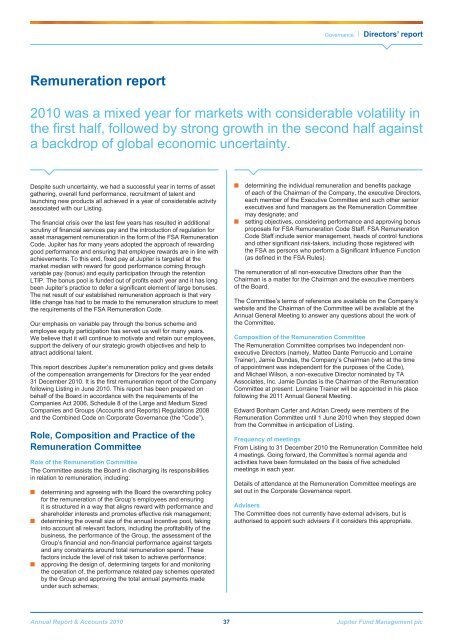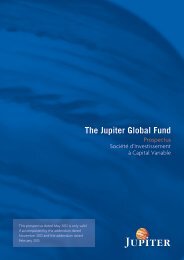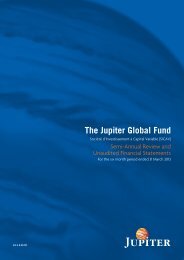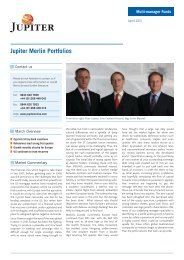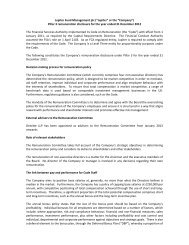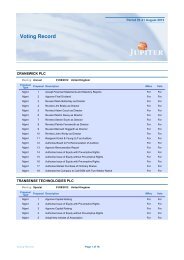Jupiter Annual Report 2010 - Jupiter Asset Management
Jupiter Annual Report 2010 - Jupiter Asset Management
Jupiter Annual Report 2010 - Jupiter Asset Management
You also want an ePaper? Increase the reach of your titles
YUMPU automatically turns print PDFs into web optimized ePapers that Google loves.
Governance | Directors’ report<br />
Remuneration report<br />
<strong>2010</strong> was a mixed year for markets with considerable volatility in<br />
the first half, followed by strong growth in the second half against<br />
a backdrop of global economic uncertainty.<br />
Despite such uncertainty, we had a successful year in terms of asset<br />
gathering, overall fund performance, recruitment of talent and<br />
launching new products all achieved in a year of considerable activity<br />
associated with our Listing.<br />
The financial crisis over the last few years has resulted in additional<br />
scrutiny of financial services pay and the introduction of regulation for<br />
asset management remuneration in the form of the FSA Remuneration<br />
Code. <strong>Jupiter</strong> has for many years adopted the approach of rewarding<br />
good performance and ensuring that employee rewards are in line with<br />
achievements. To this end, fixed pay at <strong>Jupiter</strong> is targeted at the<br />
market median with reward for good performance coming through<br />
variable pay (bonus) and equity participation through the retention<br />
LTIP. The bonus pool is funded out of profits each year and it has long<br />
been <strong>Jupiter</strong>’s practice to defer a significant element of large bonuses.<br />
The net result of our established remuneration approach is that very<br />
little change has had to be made to the remuneration structure to meet<br />
the requirements of the FSA Remuneration Code.<br />
Our emphasis on variable pay through the bonus scheme and<br />
employee equity participation has served us well for many years.<br />
We believe that it will continue to motivate and retain our employees,<br />
support the delivery of our strategic growth objectives and help to<br />
attract additional talent.<br />
This report describes <strong>Jupiter</strong>’s remuneration policy and gives details<br />
of the compensation arrangements for Directors for the year ended<br />
31 December <strong>2010</strong>. It is the first remuneration report of the Company<br />
following Listing in June <strong>2010</strong>. This report has been prepared on<br />
behalf of the Board in accordance with the requirements of the<br />
Companies Act 2006, Schedule 8 of the Large and Medium Sized<br />
Companies and Groups (Accounts and <strong>Report</strong>s) Regulations 2008<br />
and the Combined Code on Corporate Governance (the “Code”).<br />
Role, Composition and Practice of the<br />
Remuneration Committee<br />
Role of the Remuneration Committee<br />
The Committee assists the Board in discharging its responsibilities<br />
in relation to remuneration, including:<br />
■■<br />
■■<br />
■■<br />
determining and agreeing with the Board the overarching policy<br />
for the remuneration of the Group’s employees and ensuring<br />
it is structured in a way that aligns reward with performance and<br />
shareholder interests and promotes effective risk management;<br />
determining the overall size of the annual incentive pool, taking<br />
into account all relevant factors, including the profitability of the<br />
business, the performance of the Group, the assessment of the<br />
Group’s financial and non-financial performance against targets<br />
and any constraints around total remuneration spend. These<br />
factors include the level of risk taken to achieve performance;<br />
approving the design of, determining targets for and monitoring<br />
the operation of, the performance related pay schemes operated<br />
by the Group and approving the total annual payments made<br />
under such schemes;<br />
■■<br />
■■<br />
determining the individual remuneration and benefits package<br />
of each of the Chairman of the Company, the executive Directors,<br />
each member of the Executive Committee and such other senior<br />
executives and fund managers as the Remuneration Committee<br />
may designate; and<br />
setting objectives, considering performance and approving bonus<br />
proposals for FSA Remuneration Code Staff. FSA Remuneration<br />
Code Staff include senior management, heads of control functions<br />
and other significant risk-takers, including those registered with<br />
the FSA as persons who perform a Significant Influence Function<br />
(as defined in the FSA Rules).<br />
The remuneration of all non-executive Directors other than the<br />
Chairman is a matter for the Chairman and the executive members<br />
of the Board.<br />
The Committee’s terms of reference are available on the Company’s<br />
website and the Chairman of the Committee will be available at the<br />
<strong>Annual</strong> General Meeting to answer any questions about the work of<br />
the Committee.<br />
Composition of the Remuneration Committee<br />
The Remuneration Committee comprises two independent nonexecutive<br />
Directors (namely, Matteo Dante Perruccio and Lorraine<br />
Trainer), Jamie Dundas, the Company’s Chairman (who at the time<br />
of appointment was independent for the purposes of the Code),<br />
and Michael Wilson, a non-executive Director nominated by TA<br />
Associates, Inc. Jamie Dundas is the Chairman of the Remuneration<br />
Committee at present. Lorraine Trainer will be appointed in his place<br />
following the 2011 <strong>Annual</strong> General Meeting.<br />
Edward Bonham Carter and Adrian Creedy were members of the<br />
Remuneration Committee until 1 June <strong>2010</strong> when they stepped down<br />
from the Committee in anticipation of Listing.<br />
Frequency of meetings<br />
From Listing to 31 December <strong>2010</strong> the Remuneration Committee held<br />
4 meetings. Going forward, the Committee’s normal agenda and<br />
activities have been formulated on the basis of five scheduled<br />
meetings in each year.<br />
Details of attendance at the Remuneration Committee meetings are<br />
set out in the Corporate Governance report.<br />
Advisers<br />
The Committee does not currently have external advisers, but is<br />
authorised to appoint such advisers if it considers this appropriate.<br />
<strong>Annual</strong> <strong>Report</strong> & Accounts <strong>2010</strong> 37 <strong>Jupiter</strong> Fund <strong>Management</strong> plc


